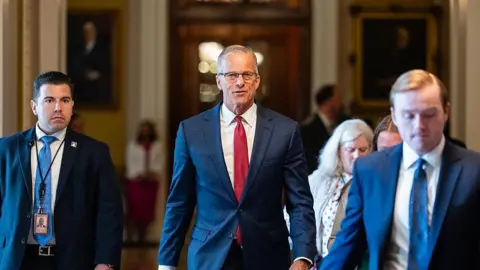US Senate approves $9bn cuts to foreign aid and public broadcasting funds
 Getty Images
Getty ImagesThe US Senate has passed a bill that seeks to cut $9bn (£6.7bn) from funds previously approved for spending by Congress, including cuts to public broadcasting and foreign aid.
The 51-48 vote happened just before dawn on Thursday, following an hours-long overnight "vote-a-rama", as the Republican-led Senate negotiated amendments.
The bill - a so-called rescissions package that allows Congress to claw back approved funding - is part of a larger effort to reduce federal spending by President Donald Trump.
It now returns to the House of Representatives, the lower chamber of Congress that had previously passed a version of the bill with $9.4bn in proposed cuts.
"It's a small but important step toward fiscal sanity that we all should be able to agree is long overdue," Senate Majority Leader John Thune said before the final vote.
Senators had previously disagreed over a proposition in the House version of the bill that would have included roughly $400m in cuts to Pepfar, the US-backed HIV/Aids programme.
Republicans were able to reach a majority after an amendment was made to keep the funding in the budget.
However, dozens of other amendments to maintain international aid spending levels and funding for public broadcasting were rejected.
The Senate version of the bill approved on Thursday would still cut roughly $8bn from multiple aid programmes, including global health programmes under USAID, the US's main philanthropic arm.
The bill would also cut more than $1bn from the Corporation for Public Broadcasting, which funds NPR and PBS as well as radio stations on which many rural Americans rely.
Senator Lisa Murkowski, from Alaska, was one of two Republicans who joined all Democrats in voting against the bill, in part due to the cuts to public broadcasting.
In reaction to the Senate passing the bill, the president of NPR, Katherine Maher, said it was "essential that its funding be sustained".
As recently as Wednesday, people in Alaska had been told to tune into a local radio station that included NPR programming to receive tsunami warning updates after an earthquake struck off the coast, Maher added in her written statement.
"We call on the House of Representatives to reject this elimination of public media funding, which directly harms their communities and constituents, and could very well place lives at risk," she continued.
The bill will next head to the House for a vote, where its path remains unclear after $400m was reduced from House-proposed spending cuts.
When asked about the changes, House Speaker Mike Johnson said: "We wanted them to pass it unaltered like we did."
Both the House and Senate must agree on a version of the rescissions package before it expires on Friday, and Republicans lose their chance to cut the funds.
